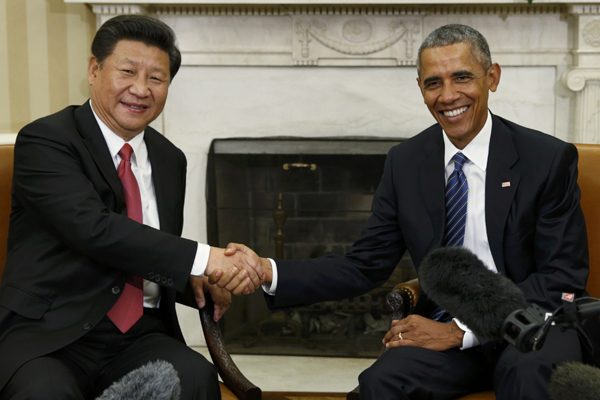Sino-US ties: Prospects for cooperation not confrontation
By Wang Honggang (chinadaily.com.cn) Updated: 2015-10-29 09:08
 |
|
US President Barack Obama (R) welcomes Chinese President Xi Jinping in the Oval Office of the White House in Washington September 25, 2015. [Photo/Agency] |
In a debate held by "Intelligence Squared US", renowned international relations experts such as John J. Mearsheimer from the University of Chicago and former Australian prime minister Kevin Rudd debated whether China and the US would become long-term enemies. The opinion poll of audiences that followed shows that 56 percent of those on site and 64 percent of those on-line said "no".
That result was within expectation. Scholars have long been discussing the structural conflict between China as a rising power and the US as an existing one, which was pacified a little as President Xi Jinping initiated the concept of "new type of major power relationship" and was echoed positively by his US colleague Barack Obama. The question has intensified again as tensions rise in the South China Sea and by other problems that might hinder bilateral relations.
Since 2010, the competition of China and US on several topics has increased the sensitivity of their bilateral relations. Their dispute on exchange rates, the "pivot to Asia" policy of the US, as well as intensified arguing between scholars on key issues, all weakened the mutual strategic between the two.
Certain media outlets also followed up by comparing the China-US relationship to that of the UK and Germany before World War I; some even predicted that a strategic confrontation between the two is inevitable, which might even lead to a new Cold War.
These opinions have their roots in reality because the two powers have different interests, especially in the Asia-Pacific region. It should be noted that Asia-Pacific is an open space where both countries could prosper on the basis of coordination. Further, they must work together because some of the problems won't be possibly solved without their joint efforts. Their relationship should never be defined by exclusive competition.
In the coming years, China and the US need to exploit the potentials in their bilateral relationship to make structural cooperation, rather than structural conflict, possible. In the past 30 years or more, their relationship has generally been on the rise, which would not be possible without their seeking common interests on the global level. More efforts are needed in the coming years.
As the largest economy in the world and its runner-up, the US and China need to manage global issues and fight global challenges. That's their common global responsibility, and will help promote their global influence, as well as make it easier to maintain a satisfying global order.
Of course, it will be a long way towards structural cooperation between the two. Just as Henry Kissinger once said, neither China nor the US is psychologically prepared for treating each other as equal partners. Leaders of both countries must be firm enough to maintain their relationship and promote it towards the better.
Only with the determination and willingness of both countries will their relationship open a glorious page in human history.
The author is a senior researcher on Sino-US relations at China Institute for Contemporary International Relations.
- History will say China ,US found a way
- China-US relations: Election rhetoric and ground reality
- US provocative act in South China Sea
- Cui calls US 'hypocritical' on island issue
- US warned over patrol by warship
- China-US climate commitments meaningful to the world: NDRC
- Xi proposes six points for developing China-US ties
- China, US have no choice but to seek win-win cooperation: Xi
- Openness, respect, can make China-US relationship something more

I’ve lived in China for quite a considerable time including my graduate school years, travelled and worked in a few cities and still choose my destination taking into consideration the density of smog or PM2.5 particulate matter in the region.











